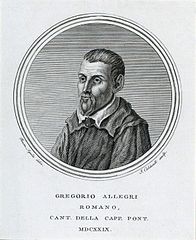
To readers of Science 2.0, Pope Urban VIII is almost exclusively known for having summoned Galileo to Rome in 1633 and forcing him to recant his work. However, from what I watched on TV last night, Pope Urban will soon find himself in the bad books of musicians also.
Allegri’s Miserere is perhaps the most popular piece of sacred choral music in the world. According to the programme, it was composed about the time that Galileo was being tried. Pope Urban (meddan nhw*) was so enchanted by the beauty of the work that he forbade it to be transcribed for use outside the Cistine Chapel. It was only performed during Holy Week, and aristocrats, especially those doing the Grand Tour, made a point of being there to hear it. Writing it down or performing it elsewhere was punishable by excommunication.
It didn’t get out until a century and a half later. According to the popular story (backed up by family letters), the fourteen-year-old Mozart was visiting Rome in 1770, when he first heard the piece during the Wednesday service. Later that day, he wrote it down entirely from memory, returning to the Chapel that Friday to make minor corrections. Some time during his travels, he met the British historian Dr Charles Burney, who obtained the piece from him and took it to London, where it was published in 1771. Once the piece was published, the ban was lifted; Mozart was summoned to Rome by the Pope (Clement XIV), only instead of excommunicating him, the Pope showered praises on him for his feat of musical genius. The work was also transcribed by Felix Mendelssohn in 1831.
An early and “celebrated” recording of the Miserere was that made in March 1963 by the Choir of King’s College, Cambridge, conducted by Sir David Willcocks, which was sung in English and featured the twelve year old boy soprano Roy Goodman. Goodman turned up five minutes late for the recording — he was captain of the Rugger team: there was a game that afternoon and he could not get away earlier.
Here for your enjoyment is a recording from 1985, by “Pro Cantione Antiqua”, aimed to be as close to the original as feasible. (You can follow the Latin text: a more authentic English translation is on the Wikipedia article linked above.)
*Welsh for “(so) they say”.



Comments